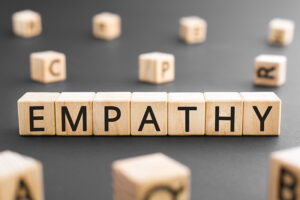By Barbara Pierce
 We have a crisis of empathy in the U.S.
We have a crisis of empathy in the U.S.
Our kids are growing up to be far less caring and compassionate than any previous generation.
The evidence is compelling. I blame technology — kids and young adults have become hooked on smartphones and other forms of screen time.
Kids are starting to use technology at younger and younger ages. Middle school teachers see differences in the way that students do or don’t show empathy for each other.
“Twelve-year-olds play on the playground like 8-year-olds. The way they exclude one another is the way 8-year-olds would play. They don’t seem to be able to put themselves in the place of other children,” said the dean of a private middle school online.
A University of Michigan study found that empathy among college students declined 40% over the past 30 years. Simultaneously, self-centered traits like narcissism and individualism rose, painting a bleak picture of an increasingly self-absorbed society.
Social media and texting drive us apart more than they connect us. How can kids learn to build empathy if they don’t have face-to-face conversations with each other?
Teaching empathy to children relies on developing their ability to understand and share the feelings of others. Face-to-face interactions play a vital role in this, as kids learn to observe and respond to nonverbal cues like facial expressions, body language and tone of voice, all critical for recognizing and interpreting emotions.
Empathy is the ability to understand and share the feelings of another person. It involves stepping into someone else’s shoes and seeing the world from their perspective. Empathy is more than just feeling sorry for someone; it’s about truly understanding their emotions and experiences.
“It’s very hard to be empathetic and feel for another human being if you can’t read another person’s emotions. You don’t learn emotional literacy facing a screen. You don’t learn emotional literacy with emojis” said Michele Borba, educational psychologist online.
Empathy is powerful. It lets us feel connected with others, understand how they are feeling. This helps us in relationships, which then predicts increased happiness in our lives. Empathy is positively associated with life satisfaction, well-being and having confidence in your own abilities. It leads to better health, better relationships, a longer life and success in the workplace.
Babies are born loving and accepting; as humans, we’re hardwired for empathy. Some babies show empathy as early as 3 months. They cry when hearing another baby crying. How do we make sure that they continue this love and acceptance as they grow? How do we raise good humans? As a mother, I certainly wanted that for my daughter. And for my grandkids, who are so absorbed by their screens.
Like any skill, empathy can be taught and developed in children. From the time they are babies, our kids watch and imitate us. They watch how we smile, how we hold our fork, how we talk on the phone and how we interact with family, neighbors, community helpers, people with disabilities, cashiers. They take it all in and learn from us.
We can’t just tell our kids what to say and how to act, we have to show them. Since they’re always watching us, it’s important that we model the behaviors we want them to demonstrate — like saying “please” and “thank you,” making eye contact, offering help, asking questions, giving compliments, apologizing and acknowledging your feelings and the feelings of others. They’ll notice if we welcome a new family in our child’s school or express concern about another child going through a difficult time.
Share empathetic statements that show you are taking the perspective of others like, “Noah seems very sad that he lost his father,” “Olivia got mad at her sister for taking her doll away.”
Encourage your children to identify their own feelings and distinguish these from the feelings of other people. Talk openly about emotions rather than dismissing or burying them. If your child is afraid of the dark, instead of saying, “There’s nothing to be afraid of,” explore the child’s feelings: “What scares you about the dark?” If your child doesn’t like another child, don’t immediately say, “That’s wrong,” but ask why the child feels that way. This can lead to a discussion about the other child’s actions and why the child might be acting that way.
Never punish a child for feeling sad or angry. Make it clear that all emotions are OK. Teach them how to soothe themselves and “bounce back” from negative emotions.
When your child shows empathy for others, praise him. Make the praise specific: “You brought your sister a Band-Aid for her scraped knee so she would feel better. That was so kind and helpful!”
Parents can control how much violent media their kids consume — which may help prevent children from becoming sensitized. Balance screen time with other activities, playing outside, reading and face-to-face time with others.
 Barbara Pierce is a retired licensed clinical social worker with many years of experience helping people. If you would like to purchase a copy of her book, “When You Come to the Edge: Aging” or if you have questions for her, contact her at barbarapierce06@yahoo.com.
Barbara Pierce is a retired licensed clinical social worker with many years of experience helping people. If you would like to purchase a copy of her book, “When You Come to the Edge: Aging” or if you have questions for her, contact her at barbarapierce06@yahoo.com.

